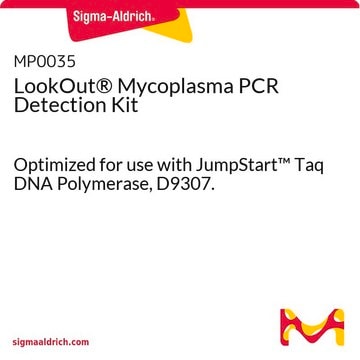NA2010
GenElute™ Blood Genomic DNA Kit
sufficient for 70 purifications
Sinónimos:
Blood Genomic DNA, Gen Elute
About This Item
Productos recomendados
uso
sufficient for 70 purifications
técnicas
DNA purification: suitable
temp. de almacenamiento
15-25°C
room temp
¿Está buscando productos similares? Visita Guía de comparación de productos
Categorías relacionadas
Descripción general
Aplicación
- to extract DNA from samples of large granules (LG) and smaller granules (SG) obtained from vasectomized rabbits
- to isolate DNA from the blood samples
- to extract whole blood DNA from the left blood cells
- restriction endonuclease digestions
- PCR
- Southern blots
- sequencing reactions
- cloning
Características y beneficios
- Starting material: Up to 200 μl of fresh or aged blood
- Expected yield: Up to 10 μg
- Elution volume: 400 μl
- Time required: <40 min
- A260/A280 ratio: 1.6 - 1.9
- Compatible with many anticoagulants, including EDTA, Heparin, and Sodium Citrate
Principio
The expected yields of genomic DNA will vary depending on the amount and nature of the starting material used (for example, 4 to 10 μg of RNase A-treated DNA can be isolated from 200 μl of fresh whole blood in less than one hour). DNA purified with this kit has an A260/A280 ratio between 1.6 and 1.9 and can be up to 50 kb in length.
Otras notas
Información legal
Opcional
Producto relacionado
Palabra de señalización
Danger
Frases de peligro
Consejos de prudencia
Clasificaciones de peligro
Acute Tox. 4 Oral - Aquatic Acute 1 - Aquatic Chronic 2 - Eye Dam. 1 - Resp. Sens. 1 - Skin Irrit. 2 - STOT SE 3
Órganos de actuación
Respiratory system
Código de clase de almacenamiento
10 - Combustible liquids
Certificados de análisis (COA)
Busque Certificados de análisis (COA) introduciendo el número de lote del producto. Los números de lote se encuentran en la etiqueta del producto después de las palabras «Lot» o «Batch»
¿Ya tiene este producto?
Encuentre la documentación para los productos que ha comprado recientemente en la Biblioteca de documentos.
Los clientes también vieron
Protocolos
Whole genome amplification (WGA) of plasma and serum DNA presents a unique challenge due to the small amount of nucleic acid in such samples.
Protocol extracts genomic DNA from blood cards, useful for limited DNA samples in amplification.
Simple DNA isolation protocol from whole blood samples for genomic analysis, followed by GenomePlex® amplification.
The GenElute™ Blood Genomic DNA Kit Protocol provides a simple and convenient way to isolate pure genomic DNA from fresh or aged whole blood.
Nuestro equipo de científicos tiene experiencia en todas las áreas de investigación: Ciencias de la vida, Ciencia de los materiales, Síntesis química, Cromatografía, Analítica y muchas otras.
Póngase en contacto con el Servicio técnico











